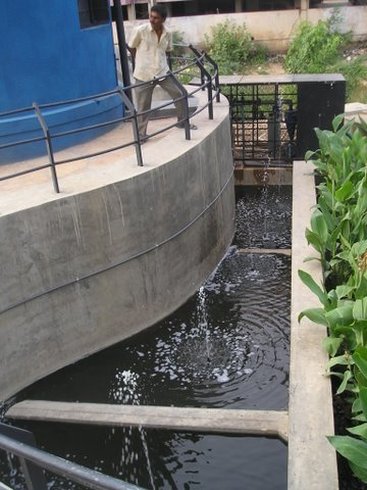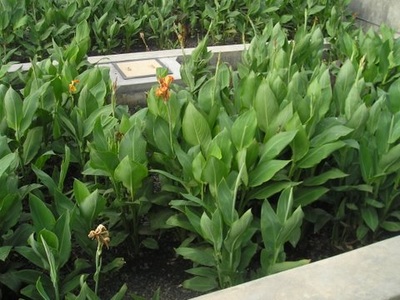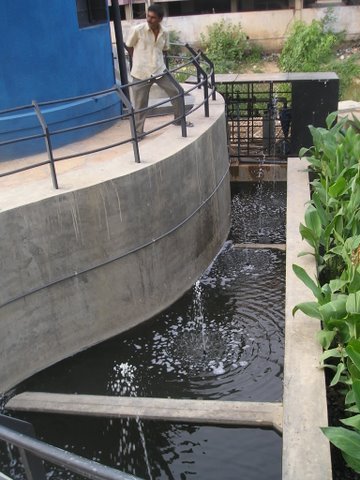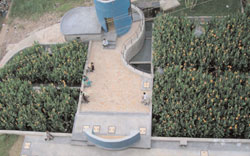RECYCLING SEWERAGE

Hunnarshala has been trying to recycle sewerage in different decentralized locations and explore avenues to benefit the city. To this end, we have installed three DEWATS (DEcentralized WAter Treatment System) units to demonstrate the concept's applicability in different situations, including a unit to recycle 15,000 liters of sewerage and landscape 1 km of a rivulet’s banks, which form a part of the city’s watershed.
The rivulet was a dump yard filled with garbage, sewerage and bushes, which was used by people for open defecation. Now with the help of Bhuj Municipality, sewage from the municipal sump is fed to the microorganisms in DEWATS treatment plant and the treated water is used to bring life to a kilometer of a rivulet's banks and transform the neglected rivulet in to the lungs of Bhuj city. The Green belt has been planted with high quality organic Kharek (Dates) trees along with saplings of more than 126 local species. The entire treatment is based on gravity flow and has no movable parts that need maintenance or technical personnel to manage. A gardener oversees the plant.
The DEWATS system has been designed so that it can function as a public space which used by morning walkers for yoga or by children for playing in the evenings. Hunnarshala and its partner organizations had to resort to ‘Gandhigiri’ tactics and took to cleaning the garbage personally to convince residents in adjoining areas to not throw garbage in the rivulets. Now some societies along the rivulet that had built high compound walls are contemplating tearing them down and opening themselves to the Green Belt
Hunnarshala and Municipality of Bhuj are collaborating to develop an urban watershed project to ensure effective water use at the city scale. Hunnarshala and its partner organizations are confident of recycling more than 60% of the city sewerage and thereby reducing 30% of the requirement of water for Bhuj.
This project demonstrates the solutions to the multitude of problems faced by Indian cities. Our nallas and water bodies have shrunk, even disappeared, causing havoc in the monsoons, with waters leaving the nallas to flood parts of cities, causing loss of lives and to the economy.
The DEWATS sewerage treatment plant and the landscaped banks of the rivulet are built with the help of India Today readers and support of the American India Foundation (AIF). Hunnarshala oversees the maintenance of the plant.
The rivulet was a dump yard filled with garbage, sewerage and bushes, which was used by people for open defecation. Now with the help of Bhuj Municipality, sewage from the municipal sump is fed to the microorganisms in DEWATS treatment plant and the treated water is used to bring life to a kilometer of a rivulet's banks and transform the neglected rivulet in to the lungs of Bhuj city. The Green belt has been planted with high quality organic Kharek (Dates) trees along with saplings of more than 126 local species. The entire treatment is based on gravity flow and has no movable parts that need maintenance or technical personnel to manage. A gardener oversees the plant.
The DEWATS system has been designed so that it can function as a public space which used by morning walkers for yoga or by children for playing in the evenings. Hunnarshala and its partner organizations had to resort to ‘Gandhigiri’ tactics and took to cleaning the garbage personally to convince residents in adjoining areas to not throw garbage in the rivulets. Now some societies along the rivulet that had built high compound walls are contemplating tearing them down and opening themselves to the Green Belt
Hunnarshala and Municipality of Bhuj are collaborating to develop an urban watershed project to ensure effective water use at the city scale. Hunnarshala and its partner organizations are confident of recycling more than 60% of the city sewerage and thereby reducing 30% of the requirement of water for Bhuj.
This project demonstrates the solutions to the multitude of problems faced by Indian cities. Our nallas and water bodies have shrunk, even disappeared, causing havoc in the monsoons, with waters leaving the nallas to flood parts of cities, causing loss of lives and to the economy.
The DEWATS sewerage treatment plant and the landscaped banks of the rivulet are built with the help of India Today readers and support of the American India Foundation (AIF). Hunnarshala oversees the maintenance of the plant.


